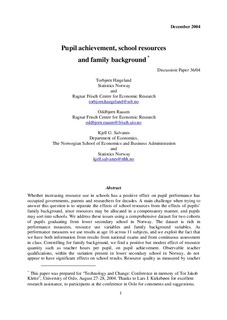Pupil achievement, school resources and family background
Working paper
Permanent lenke
http://hdl.handle.net/11250/163284Utgivelsesdato
2004-12Metadata
Vis full innførselSamlinger
- Discussion papers (SAM) [657]
Sammendrag
Whether increasing resource use in schools has a positive effect on pupil performance has
occupied governments, parents and researchers for decades. A main challenge when trying to
answer this question is to separate the effects of school resources from the effects of pupils’
family background, since resources may be allocated in a compensatory manner, and pupils
may sort into schools. We address these issues using a comprehensive dataset for two cohorts
of pupils graduating from lower secondary school in Norway. The dataset is rich in
performance measures, resource use variables and family background variables. As
performance measures we use results at age 16 across 11 subjects, and we exploit the fact that
we have both information from results from national exams and from continuous assessment
in class. Controlling for family background, we find a positive but modest effect of resource
quantity such as teacher hours per pupil, on pupil achievement. Observable teacher
qualifications, within the variation present in lower secondary school in Norway, do not
appear to have significant effects on school results. Resource quality as measured by teacher characteristics does not appear to have a significant impact on pupils’ marks. We find clear
evidence of compensating resource allocation and teacher sorting as well as relative setting of
marks.
Utgiver
Norwegian School of Economics and Business Administration. Department of EconomicsSerie
Discussion paper2004:36
